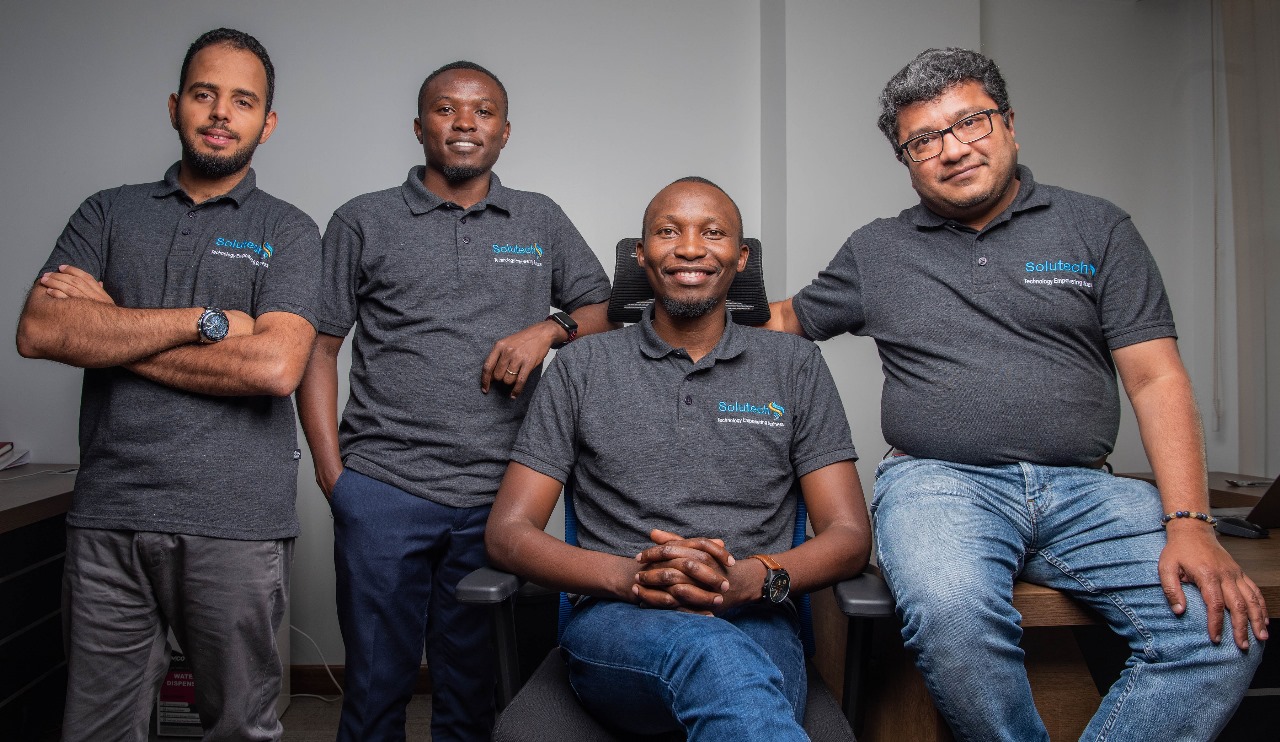 Solutech Chief Technology Officer Rayyidh Bayusuf, Chief Operations Officer Mutie Mule, Chief Executive Officer Alexander Odhiambo and Chief Growth Officer Jinal Savla.
Solutech Chief Technology Officer Rayyidh Bayusuf, Chief Operations Officer Mutie Mule, Chief Executive Officer Alexander Odhiambo and Chief Growth Officer Jinal Savla.Picture this, an employer sits at their desk, staring at a
proposal for a new automation tool that promises real-time insights, improved
distribution, and smoother sales operations.
On paper, the tool is brilliant, but in the employer's mind,
questions as to whether their team will feel threatened by the software,
believing that it will replace them, linger.
“Every time a new technology emerges, there is always that
anxiety as to whether this technology will open up new opportunities, or create
challenges such as loss of jobs,” says Alex Odhiambo, CEO of Solutech.
However, Alex observes that new technologies such as
artificial intelligence (AI) and automation, were never meant to replace
people. At their best, they amplify human ability.
Automation tools do not erase the judgment of a field
officer or the relationships a salesperson nurtures but instead, they give
these professionals sharper insights, clearer direction and real-time feedback.
“Think of them as the compass in a long journey, not walking
the path for you, but making sure you do not get lost along the way,” says
Odhiambo.
Indeed, the real magic happens not in the software itself,
but in how people use it. A team that understands why new technology has been
introduced does not see it as a surveillance system but as support.
When training is done well, the fear of being watched melts
away, replaced by the confidence of being equipped.
Suddenly, a salesperson is no longer filling forms they do
not understand; they are translating customer visits into actionable insights.
A distributor is not just dropping off goods; they are working with clarity on
what is needed, where, and when.
“Employers who invest in training soon discover that data
stops being abstract, it becomes the language of smarter decisions. Teams
evolve from simply carrying out tasks to actively shaping growth,” says Mutie
Mule, Chief Operations Officer, Solutech.
Across Africa, companies are already writing their own
success stories. A manufacturer that once struggled with constant stock-outs
now uses automation tools to ensure every shelf is filled on time.
FMCG field teams, armed with real-time dashboards, can spot
gaps and act instantly, instead of waiting weeks for reports. Service
providers, too, find that visibility into their operations means fewer missed
opportunities and happier customers.
The common thread? When employees understand the tools, they
stop resisting them. The tools work for them, not against them, and the
business reaps the rewards.
In Kenya, companies such as Solutech Limited, are providing
these sales automation and field force solutions that are transforming how
businesses across the region are conducting their operations.
“What sets Solutech apart is not just the technology it
offers, but the people behind it,” says Jinal Savla, Chief Growth Officer,
Solutech.
The company’s management team brings together deep technical
expertise with an understanding of what local businesses truly need: tools that
work in real conditions, not just in theory.
That blend of vision and local insight has enabled the
company to expand its footprint into multiple countries while staying true to
its Kenyan identity.
Today, their solutions are trusted by more than 80 companies
handling thousands of brands. Yet at the heart of it all lies a simple
philosophy: technology is only as strong as the people who use it.
This is the philosophy Kenyan employers can take to heart.
The real investment is not in a dashboard or a license, it is in the people who
breathe life into these tools.
“By prioritizing training, leaders send a powerful message
to their teams: We trust you. We are here to support you. You are part of this
journey,” says Rayyidh Bayusuf, Chief Technology Officer, Solutech.
The result? Teams that do not just comply with new systems
but also embrace them. Employees who see the tool not as a threat, but as a
partner, and businesses that do not just improve productivity but also nurture
loyalty, boost morale, and secure long-term growth.
At the end of the day, automation is not about cold numbers
or faceless algorithms. It is about giving people the clarity to perform at
their best, the confidence to make smarter choices, and the space to focus on
what humans do best; building relationships and creating value.
When employers take the time to prepare their people, they
discover that technology does not strip away the human touch in business, it
strengthens it.
In a business environment as fast-moving and dynamic as
Kenya’s, that balance between people and technology is not only an advantage.
It is a necessity.



















